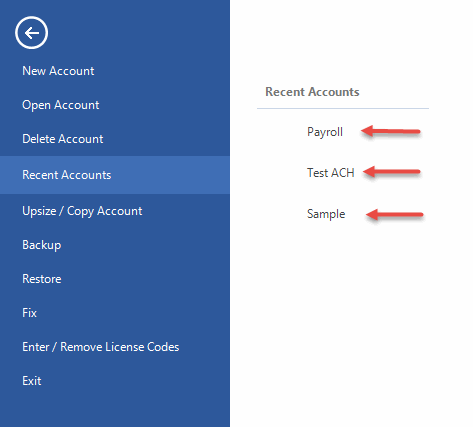Multiple Origination Accounts and Third Party NACHA (Processor) Rules
What is an Origination Account?
An Origination Account is a bank account that you own (or control), that you send payments from, or where incoming funds are collected.
For example, a company's payroll account that is set up for ACH service would be an origination account.
How do we work with more than one account?
We are a large company and have two origination accounts--one for payroll and one for vendor payments (A/P).
How do we work with multiple accounts?
Two approaches: 'Traditional' vs. 'Consolidated'
When working with multiple origination accounts, a company can choose whether to create and send an ACH file from each account or to consolidate all into one single ACH file.
1. Traditional approach
You would create multiple accounts (databases) within ACH Universal.
Each account will create an ACH file.

The traditional approach is best used when there is a need to segregate duties and access to data. Often, payroll will be a separate function, and the 'net pay' needs to be private.
2. Consolidated (a.k.a. Multiple Origination Accounts - Third Party Fiduciary NACHA Rules)
With ACH Universal Advanced (Processor) edition, we offer our customers the ability to work with a single ACH file.
Example:
A benefit plan administrator (processor) needs to make payments weekly on behalf of their 50 clients.
In this case, it is best to use the consolidated approach. What would have been 50 separate files is now a 'batch' within one ACH file.
The Batch Header provides the bank with the 'Origination' account.

Advantages
By using a single, consolidated file, the processor can minimize the tedious and error-prone process of transmitting (and confirming) 50 individual files. Also, if the processor is normally charged a service fee of $15 per ACH file by their bank, for instance, the processor saves $735 each week (49 files not transmitted x $15).
NACHA compliance
By placing the originating Company Name in the batch header ('5' record, positions 5 - 20), you will stay in compliance with NACHA's Third Party Rules and Regulations.
Not just for processors
The Advanced (Processor) edition of ACH Universal is for:
• Law firms - or other fiduciaries who cannot co-mingle escrow accounts
• Company administrators - with divisional/regional/sites and consolidation or sweep accounts
• Company administrators - who need segregation of duties for disbursements, payroll and depository accounts
• Service providers - ACH processors who collect funds on behalf of others
• Outside legal ownership - such as a payroll company drafting on others' accounts






